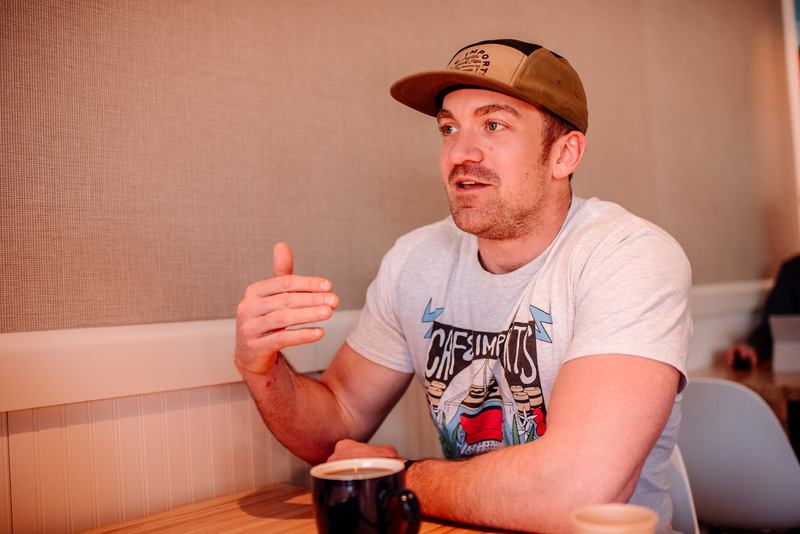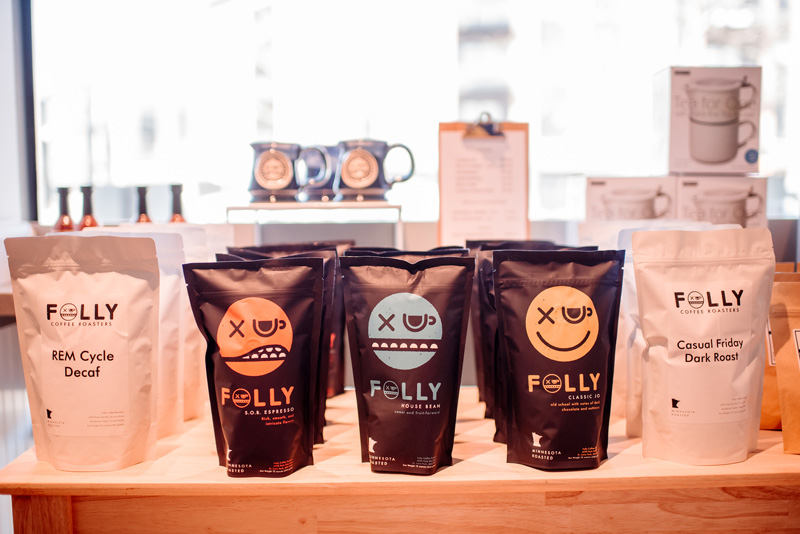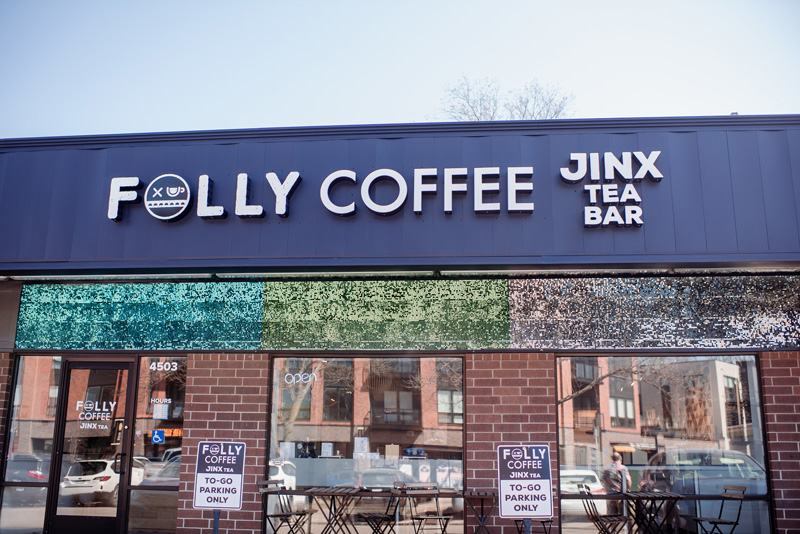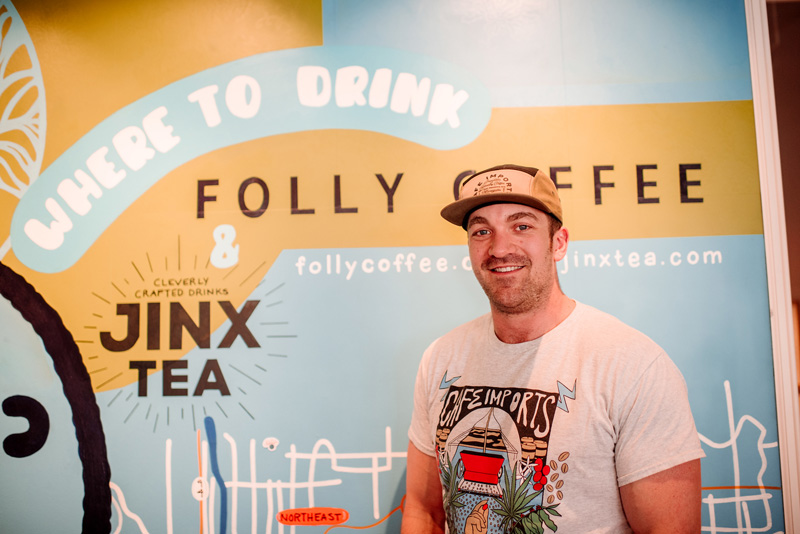PHOTOGRAPHY BY BECCA DILLEY / HEAVY TABLE
This story originally appeared in the Hearth, the Heavy Table’s newsletter about home cooking, cookbooks, farmers, and makers. You can get the Hearth by backing us on Patreon.
I take a sip of the coffee that Folly Coffee co-founder Rob Bathe has put in front of me and I take a pause to gather my disordered thoughts. The coffee is the first in Folly’s Experimental Series, and it’s a tornado of inputs that doesn’t really clearly resolve into coffee as I know it. Blindfold me, and the complex lavender / floral / spice notes would let you lie me into thinking I’m drinking blended black tea, or even a rare beer.
The coffee is a product of carbonic fermentation, honey processing, Gesha beans, and a fermentation with Galaxy hops. “I’ve never had a coffee quite like it,” says Bathe. “It comes in almost like a spicy ginger. And in the finish you get a little bit of that drying you get from hops. The Gesha is a floral variety, as well.”
The Experimental Series is an interesting data point when it comes to telling the story of Folly because it shows roaster Jeff Mooney’s capabilities and counterpoints the five-year-old company’s bankable strengths: marketing coffee with clear, classic, accessibly described flavor profiles that make buying easy for retail and wholesale customers alike.

“I think the approach of high-end coffee in the past has been: ‘We’re going to tell you how to drink this, and if you don’t have an espresso machine at home, or a pour-over, this isn’t for you.’ We want to meet coffee drinkers where they already are.” Bathe points out that most people aren’t hand pulling espresso shots or using pour-over rigs at home – they’re using drip coffee brewers. “And they don’t have a burr grinder, they have a blade grinder. Is that ideal? No. You’re not going to make the best possible cup. But if you use a good coffee as a first step, it’ll be better than what you were already drinking.
A BREAKTHROUGH ESPRESSO
Bathe got his start as a beer salesman, but became “obsessed,” in his words, with specialty coffee. He started Folly solo in 2018, with Eastside Food Co-op as his first customer.
“The ties to Eastside actually go even deeper, because that’s where I met Jeff [Mooney], who’s our head roaster now, he was actually working at Eastside Co-op,” says Bathe. “I would go in every week and he would just keep asking me more and more intense coffee questions. And eventually, he was like: ‘How do I get into the coffee industry?'”
The answer to that question turned out to be Folly, where Bathe was finding that his roasting skills were good – but not great. “I found if you use a good quality coffee, it’s not hard to roast a good cup,” he recalls. “It’s very very difficult to roast a great cup consistently. I thought: If I’m going to do this in any reasonable amount of time, I need to find someone to do the roasting.”

These days, Folly puts out five regular coffees. It’s an evolution from their launching lineup of House Bean, Classic Jo, and Winer, which, as Bathe tells it, “focus on the three main flavor profiles – sweet and fruit forward, nutty and chocolatey, or the Winer, bright and high acid. But enough people were like: ‘When are you going to do an espresso?'”
The answer that Bathe and Mooney came up with to that question turned out to change the entire trajectory of their business. “Jeff came up with the idea of [using] a single origin coffee that roasted really nicely light and dark, and blending it back together in post-roast. So you have that traditional darker roasted espresso profile, but the lighter portion will bring out the lighter single origin qualities.” Mooney and Bathe liked the way that solution sounded, and they looked around to confirm that it was a standard practice. “That has to be a thing, right?”, Bathe recalls them asking each other. But they couldn’t find a trace of it online.
“So we started experimenting with different roast profiles and origins, and … when we completed it, CoffeeReview.com was having a national review of traditional espressos and we tied for first place [in 2019]. That’s been our flagship espresso and it’s our best seller.”
BRICKS AND MORTAR AND BEANS
Folly roasts its coffee in a St. Louis Park space that the company shares with a handful of other companies. But at the end of last year, the company spread its wings and got into a clean, bright, bricks and mortar spot in Linden Hills, co-located with Jinx Tea. “[Jinx founder] Chris [Eilers] reached out to me last year about creating the Folly Coffee Shop at Jinx Tea Shop and I said ‘we’re a team of two people, we’re not in a position to hire a full team to manage and run a cafe,'” recalls Bathe. “He said: ‘We already have a team in place.'” Folly creates and updates the coffee menu, and Jinx maintains the retail and cafe space. “Having a storefront … we want people to taste the coffee and be able to go directly to the source,” says Bathe. “We’re roasting and then delivering directly to here. We’re doing a monthly coffee class now – it’s nice to have the space to be able to do things like that.””

The shop, says Bathe, is a bit of a 180 from the all remote chaos of the pandemic years, which define a good chunk of Folly’s history. “In March of 2020, 80% of our business was wholesale,” says Bathe. “When cafes and restaurants closed, 80% of our business went away overnight. So I went into a panic-induced manic productivity mode… we did as much research as we could to launch a website that was better so people could have [coffee] subscriptions, and over a period of 72 I slept about six hours total, and got that website live by the end of the week. And that’s really what kept us alive, is there was an outflowing of support – not only people who wanted to support us, but people who were like: ‘hey, I don’t want to leave my home, but I still want coffee.’ Six months later, we launched fully customizable subscriptions, which gave us another jump.”
Even better, as things calmed down, Bathe says that the stronger web presence has helped the company balance its revenue between wholesale, retail, and online sales. “That’s a much more comfortable and balanced way to run a business, so you’re not as dependent on a time of the year or a customer base,” he says.
A SCENE ON THE RISE
Bathe says his location couldn’t be better in a greater sense, too – the Minneapolis-St. Paul scene is thriving. “It’s a very underrated scene nationally,” he says. “Cafe Imports is one of the country’s best specialty coffee importers and they’re based in Northeast Minneapolis. Mill City Roasters, which makes actual coffee roasters are based in Northeast, too. They’re one of the country’s leading manufacturers and they’re fast-growing, too. So that makes for a rapidly growing scene on the cafe side, too. We’re seeing customers who are willing to go out of their way to get a better cup of coffee, and roasters are popping up to meet that demand.”
Restaurants, too, are serving better beans prepared more skillfully to meet customer demand, and as the overall craft beer and food scene has soared, coffee has come along with the ride. Meanwhile, he adds, specialty roasters have gotten better at meeting customers where they are.
“It’s a big balance,” says Bathe. “We want people to be interested and learn more, but we also don’t want people to think we’re talking down to them. It’s a cup of coffee.”
Folly Cafe, 4503 France Ave S Minneapolis, MON-SAT 7am–6pm, SUN 8am-6pm

